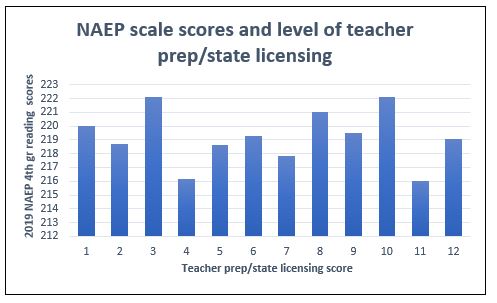The National Council on Teacher Quality (NCTQ) has a new publication that analyzes the strength of both teacher prep programs and teacher licensure requirements for all the states (plus D.C.). The report asserts:
States’ regulation of teacher preparation programs establishes essential parameters, guiding teacher prep programs to provide the skills and knowledge public school teachers need. States also set the criteria that teachers must satisfy to earn a teaching license, but the particular criteria vary quite a bit from state to state.
An analysis such as this begs the question: Is there a relationship between the level of rigor required for teacher prep programs/licensing requirements and student achievement? If there is, one would hypothesize that the states with stronger requirements would have higher student achievement.
NCTQ chose twelve variables to analyze and scored the states as to their level of rigor on each variable. NCTQ chose NOT to compile an overall score and ranking for each state. However, by combining the scores of each variable for every state, I was able to come up with an overall modified ranking. Then I used the results from the 2019 NAEP assessment on 4th-grade reading – I chose 4th-grade reading because several of the 12 variables used by NCTQ relied heavily on teaching elementary reading – to test a relationship between student achievement and teacher prep/state licensing rigor. The assumption being that the higher the threshold the higher the reading scores would be.
The graph shows that there is no such relationship. For example, the only state that scored a “perfect” 12 for rigor is Tennessee, but their NAEP 4th-grade reading scores are actually below the national average. At the other end of the spectrum, Wyoming is one of three states at the bottom in terms of rigor (a score of 1) but had the third highest NAEP scores in the country.
 What does this mean? Focusing on systemic inputs to “improve” teacher candidates – like having more rigorous teacher prep programs at the college level and having a higher threshold for earning a teaching license – isn’t working to improve outcomes of student achievement. Raising those requirements is akin to putting a bigger band-aid on a gunshot wound.
What does this mean? Focusing on systemic inputs to “improve” teacher candidates – like having more rigorous teacher prep programs at the college level and having a higher threshold for earning a teaching license – isn’t working to improve outcomes of student achievement. Raising those requirements is akin to putting a bigger band-aid on a gunshot wound.
What does it mean specifically for Kansas? Kansas has a low score compared to other states – Kansas is one of seven states to score a 4 – but it’s not the rigor that is the problem. Clearly, Kansas has much room to improve in terms of strengthening requirements for getting into teacher prep programs and qualifying to get a teaching license. Nevertheless, the low NAEP scores in Kansas (now below the national average) are a function of assessments now deemphasized by the state board of education and KSDE. When the focus of new initiatives is on inputs to an already struggling system, such as Kansans Can and Race to the Moon student achievement will not improve.
If there is no focus on student outcomes, it doesn’t matter how rigorous the qualifications are for teacher candidates, both in teacher prep programs and licensure requirements, achievement will not improve. Yes, having great teachers is paramount, and NCTQ should be lauded for its efforts to improve the quality of teachers in the field. But in terms of student achievement, simply ratcheting up requirements for a teacher to get in the door will not cut it.




